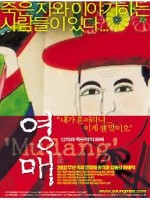130, Suyeonggangbyeon-daero,
Haeundae-gu, Busan, Republic of Korea,
48058
DATABASE
Mudang-Reconciliation Between The Living And The Dead (2003)
< Young-mae - San Ja-wa Jook-eun Ja-eui Hwa-hae >
In Korea, mu(Korean shamanism) constitutes an important part of people's lives. For example, Koreans hold a gosa(sacrifice offered to the spirits) before embarking on a new project, to invoke the spirits for good fortune. To these Koreans, mu is more than a religion. It is a way of life. Mudangs(Korean shamans) predict future events and act as mediators between the living and the dead through a gut(shamanistic ritual involving the spirits). In this sense, mudangs can be seen ...more
| Genre | Documentary | Production Status | Released |
|---|---|---|---|
| Running Time | 111min | Release Date | Sep 05, 2003 |
| Country | South Korea | Rating | 12 |
| Language | Co-Production | N | |
| Original |
-
Number of Screens : 1
-
Total Admissions : 15
-
Total Gross : $44
As of Feb 12, 2026
-
M&FC | mnfc@mnfc.co.kr
- Republication, copying or redistribution by any means is prohibited without the prior permission of KOFIC and the original news source.







